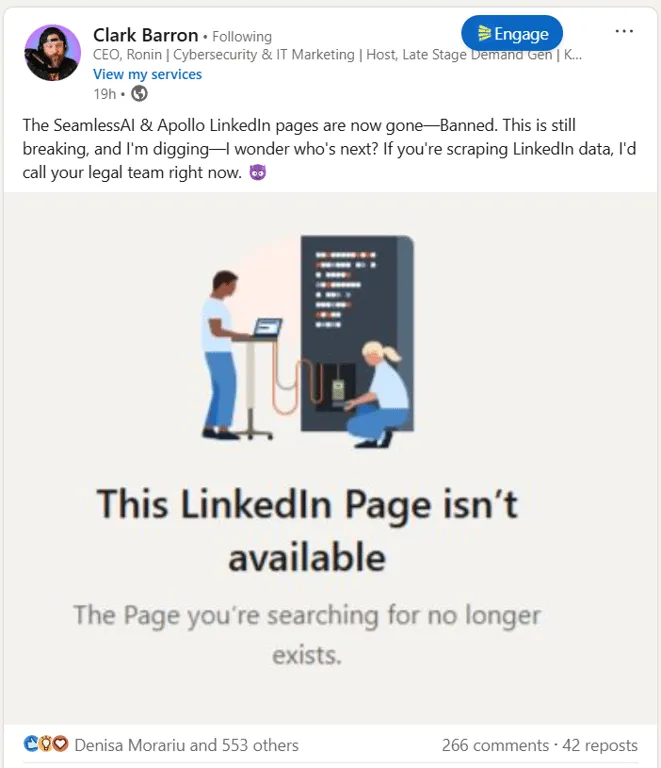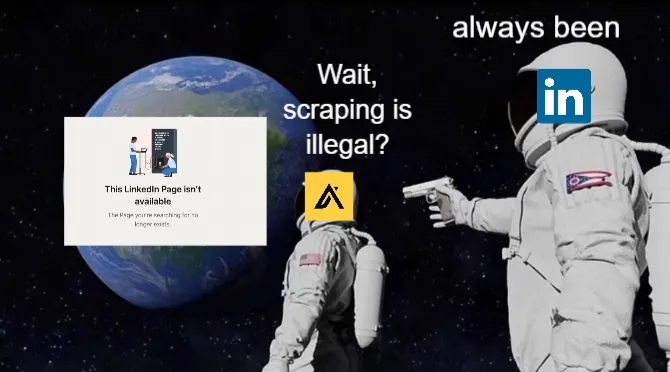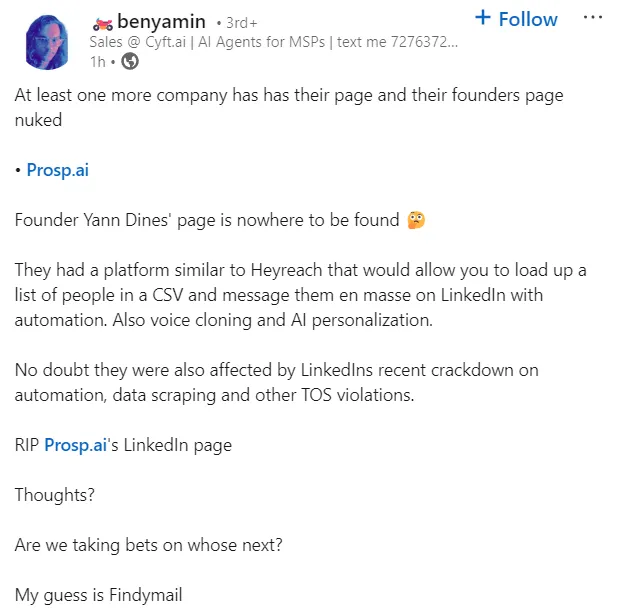
Last updated: March 8, 2025
LinkedIn has launched what appears to be a significant enforcement campaign against companies that scrape data from its platform, with several prominent sales intelligence tools suddenly finding their company pages removed. This development could reshape how professionals approach lead generation and outreach on the platform.
The Casualties So Far
In what seems to be a coordinated enforcement action, LinkedIn has removed the company pages of several sales intelligence platforms:
-
Apollo.io - A popular sales intelligence and engagement platform
-
Seamless.AI - An AI-powered lead generation platform
-
Prosp.ai - A newer entrant offering automated messaging and voice cloning
According to reporting from MarTech and Koka Sexton, these pages disappeared from LinkedIn on March 6-7, 2025, with no official explanation from either LinkedIn or the affected companies.
What These Companies Have in Common
The common thread among these platforms is their use of browser extensions to extract data from LinkedIn profiles:
-
Chrome extensions that capture LinkedIn data
-
Automated outreach capabilities
-
Mass data collection for lead generation
-
AI-powered personalization using LinkedIn data
Why Is LinkedIn Taking Action Now?

LinkedIn has historically maintained strict policies against unauthorized data extraction, but recent developments may have accelerated enforcement:
-
Rising privacy concerns among users about how their professional data is being used
-
Increased regulatory scrutiny around data privacy and AI training
-
Protection of LinkedIn's own premium offerings which provide similar functionality through official channels
-
AI-powered detection systems making it easier to identify violators at scale
LinkedIn's Terms of Service: The Fine Print
According to LinkedIn's User Agreement, the following activities are explicitly prohibited:
-
Using bots, scripts, or other automated methods to access services
-
Scraping or copying profiles and data through automated means
-
Harvesting, collecting, or mining data without consent
-
Using LinkedIn data to train AI models without permission
-
Sharing user data with third parties without authorization
As Clark Barron notes in his analysis, many companies operate in what they perceive as a "gray area" but are actually in direct violation of these terms.
Who Could Be Next?
Based on the current pattern of enforcement, industry observers are speculating about which companies might face similar actions:
-
Identity resolution platforms that map LinkedIn profiles to other contact information
-
Website visitor identification tools that match company IP addresses with LinkedIn data
-
Email finding services that use LinkedIn information to discover contact details
-
Automated messaging platforms that facilitate mass outreach on LinkedIn
As Benyamin Holley pointed out, tools that allow mass messaging or extract contact information from LinkedIn profiles are particularly vulnerable.

The Legal Implications
LinkedIn has a history of legal action against data scrapers:
-
In 2022, LinkedIn successfully shut down Singapore-based Mantheos Ptd. Ltd. for scraping member profile data
-
LinkedIn continues to pursue legal action against hiQ Labs, a case that has been working its way through appeals
This enforcement trend suggests LinkedIn is willing to pursue both technical measures (removing pages, blocking access) and legal remedies against companies it believes are violating its terms.
What This Means for Agency Owners and Freelancers
If you're an agency owner or freelancer who relies on LinkedIn for business development, here's what you need to consider:
Immediate Actions
-
Review your tech stack - Identify any tools that interact with LinkedIn data
-
Check terms of service - Ensure compliance with LinkedIn's policies
-
Develop alternative strategies - Don't rely solely on automated tools
-
Focus on relationship building - Authentic engagement is more sustainable
Long-Term Strategy
Instead of depending on data scraping tools that violate LinkedIn's terms, focus on building a sustainable LinkedIn strategy:
-
Content-based lead generation that attracts prospects to you
-
Authentic engagement through thoughtful comments and messages
-
Building a personal brand that stands out in your industry
-
Using LinkedIn's official developer tools and APIs where appropriate
If you run LinkedIn for healthcare clients and need compliant, client-ready messaging (incident responses, service updates, or HIPAA-safe outreach), see our IT Healthcare Guardian template for plug-and-play post copy and compliance-minded prompts.
Where LiGo Stands
As a content creation tool for LinkedIn, LiGo operates differently from the platforms affected by this enforcement action:
-
LiGo doesn't scrape LinkedIn data - We only use the official API with proper authentication
-
We don't extract contact information - LiGo focuses on helping you create better content
-
Your data stays with you - We don't share your data with third parties
-
Consent-based approach - We only use data you explicitly provide
Our approach has always been to help professionals create better LinkedIn content within the platform's guidelines, not to extract data or enable mass automated outreach.
Want client-ready post examples that pair with LiGo's compliance-first tools? Browse the Client Success template for case-study formats, client announcement copy, and checklist items agencies use alongside LiGo's features.
The Future of LinkedIn Prospecting
This enforcement action signals a potential shift in how professionals will need to approach LinkedIn for business development:
-
More emphasis on organic engagement and relationship building
-
Greater scrutiny of third-party tools that interact with LinkedIn
-
Higher premium on quality content that attracts inbound interest
-
Return to more personalized, manual outreach strategies
For agency owners and freelancers, this may actually be a positive development. While it might limit some automated approaches, it creates an opportunity for professionals who focus on quality over quantity to stand out.
Bottom Line
LinkedIn's crackdown is a clear message that the platform is serious about protecting user data and enforcing its terms of service. For professionals who want to build sustainable business relationships on LinkedIn, this reinforces the value of authentic engagement and quality content over mass automated approaches.
Rather than chasing shortcuts that risk being shut down, focus on building a genuine LinkedIn presence through consistent, valuable content and engagement - an approach that will continue to work regardless of enforcement actions.
LiGo Update (2025): LiGo now supports both personal profiles AND LinkedIn company pages (early access). While we can help you manage company page content efficiently, we strongly recommend prioritizing personal profiles for maximum ROI based on industry data - personal profiles consistently generate 5-20x better engagement and lead generation results. However, for agencies managing both channels, LiGo helps maintain consistent brand voice without doubling your workload. Explore our company page resource hub →
Have questions about navigating LinkedIn's changing landscape? Check out our related articles:




